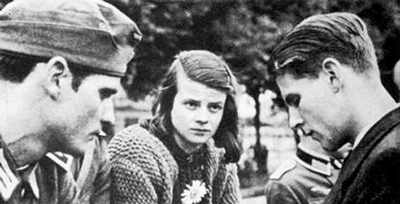There were many groups who opposed Hitler because of hit actions, his policies or his leadership. Some continued with their lives ignoring the Nazis policies, using passive resistance. Very few protested in clear view of the Nazis, because they were scared of Hitler’s power. Many were found by the Gestapo, the secret police, and either executed or taken to concentration camps without trial or explanation.
Many of the groups were unsuccessful in changing Germany
The White Rose group were students from the University of Munich Germany
 |
| The leaders of the white rose group |
They were trialled and found guilty of treason, then sentenced to death, the same day they were executed by guillotine. The last to die shouted “long live freedom” hoping it would show the bad side of the Nazis. Even though they had many who believed them they failed to change anything. This was not passive as they printed many leaflets and all knew they were opposing Nazism.
However the last leaflet was smuggled to the allies who reprinted it many times and air dropped them over Germany Germany
Hitler banned the swing movement from Germany
They were found by the Gestapo and taken without trial to concentration camps. This was passive and unsuccessful as they were stopped and did not manage to change the public opinion of the Nazis.
The Edelweiss pirates consisted of 14 to 17 year olds who had avoided the Hitler youth by leaving school and were too young for military conscription. It was legal to leave school but they did not want to join the army at 17. The Edelweiss pirates helped anyone who did not want any part of the army, for example deserters and refugees. They stole weapons from the army and a group of them attacked the Gestapo. This was not passive resistance as they physically attacked the Nazis and expressed their hate openly.
The Gestapo rounded up the members and either shaved their heads as a sign of shame or sent them to concentration camps. After their attack on the Gestapo 12 of them were publicly hanged.
The Jews in Germany obviously disliked his policies on them and in the Warsaw
This was unsuccessful as they were easily killed by the troops and then their deaths came quicker rather than later in the death camps.
In 1944 a group of officers in the army joined together who hated Hitler due to his failures in Russia
The briefcase bomb was placed a few meters away from Hitler under a conference table. The bomb detonated but Hitler survived. This was very aggressive but again failed. It slowed the Nazis progress but they continued. a film of this assassination attemp was made in 2008.
Some of the group were successful in their goals but the Nazis were still not stopped.
The church opposed the Nazis due to their policies and wanted Germany
A Catholic cardinal, Galen, campaigned against the Nazis. He managed to gather followers but nowhere near enough to overthrow the Nazis. He was attacked but survived the war. He did not change Germany but he did slow them taking over the church in Germany Germany
Two Protestants, Niemoller and Bonhoeffer, criticised the Nazis in their sermons and ignored the Nazis rule. This was passive resistance as they did not express their opposition openly. Niemoller was trialled but was suspended and survived but Bonhoeffer was sent to a concentration camp where he died. This was a failure but showed that all typed of Christianity opposed Hitler, therefore showing he was indeed damaging Germany
Oskar Schindler was an industrialist who believed it wrong to unfairly act against the Jews in Germany
He was not found by the Gestapo and the Jews survived. This was secretive and passive but was successful; it did not change Germany
The groups that opposed Hitler did not successfully change Germany
No comments:
Post a Comment